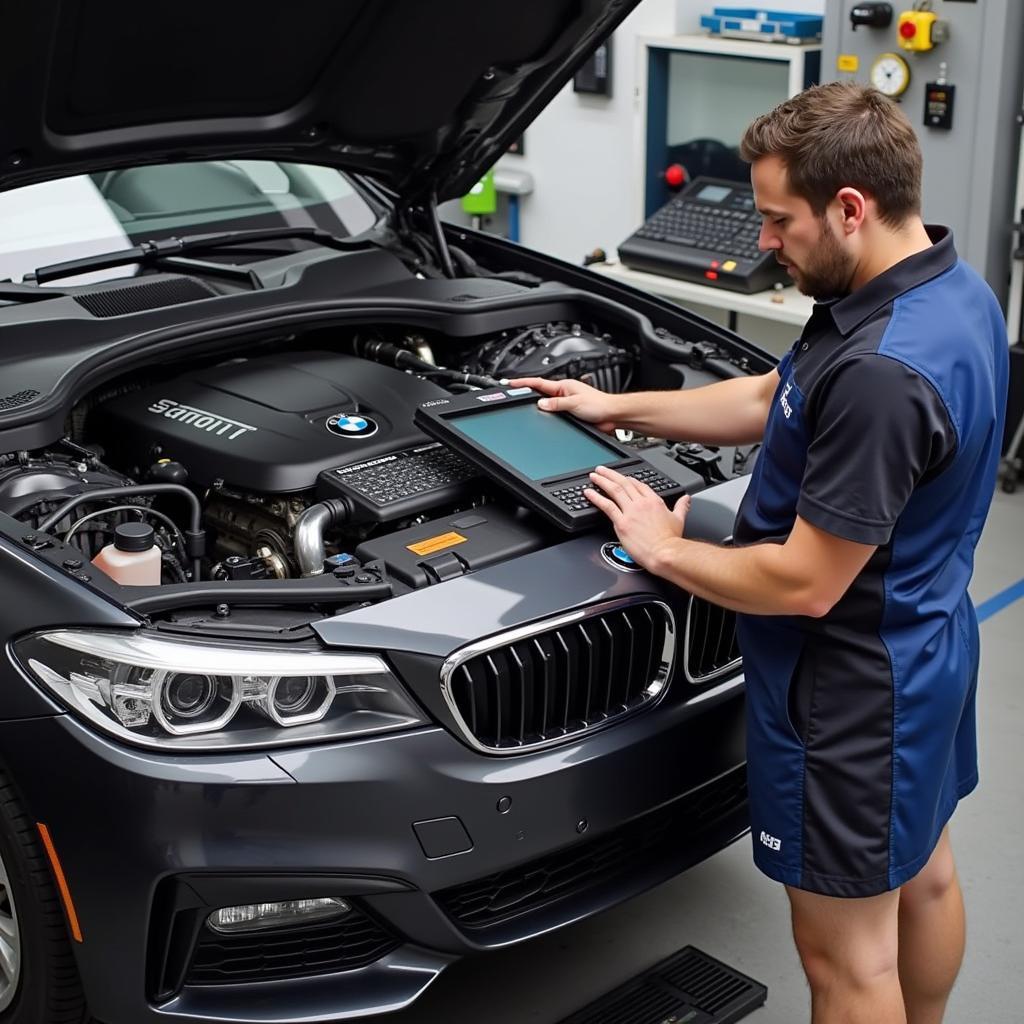The sound of your BMW E90’s exhaust is a key indicator of its performance and health. From a subtle purr to a powerful roar, understanding the nuances of your BMW E90 exhaust sound can help you diagnose potential problems and enhance your driving experience.
Whether you’re a car enthusiast, a seasoned mechanic, or simply a curious BMW E90 owner, this guide will delve into the intricacies of the E90’s exhaust system, covering everything from common issues to performance upgrades. We’ll explore the factors influencing exhaust sound, discuss troubleshooting techniques, and provide insights into maintaining optimal exhaust performance.
Decoding Your BMW E90’s Exhaust Note
The exhaust note of your BMW E90 is a complex symphony of sounds, influenced by a variety of factors. The engine’s design, the exhaust system’s components, and even the car’s overall condition can all contribute to the unique sound produced.
A healthy E90 exhaust system typically emits a smooth, refined sound. However, any deviations from this norm, such as rattling, hissing, or excessive droning, could signal underlying problems. Recognizing these subtle changes is crucial for early diagnosis and prevention of more serious issues.
Common culprits behind unusual exhaust sounds include exhaust leaks, damaged mufflers, or worn-out catalytic converters. Identifying the source of the problem requires a systematic approach, starting with a thorough visual inspection and progressing to more advanced diagnostic techniques.
Troubleshooting Common BMW E90 Exhaust Issues
One of the most frequent complaints among E90 owners is an excessively loud exhaust. This can be due to several reasons, including a perforated muffler, a cracked exhaust manifold, or even a simple loose exhaust clamp.
A hissing sound, on the other hand, often points to an exhaust leak. These leaks can occur anywhere along the exhaust system, from the manifold to the tailpipe. Locating the leak requires careful inspection and may involve using soapy water to identify escaping gases.
Another common issue is a rattling sound, often caused by a loose heat shield or a damaged catalytic converter. Ignoring these rattles can lead to more significant problems down the line.
Similar to the bmw e90 navi professional bluetooth audio, diagnosing these issues can sometimes be complex. Understanding the underlying causes and symptoms can help you effectively address these problems and restore your E90’s exhaust to its optimal performance.
Enhancing Your BMW E90’s Exhaust Sound
For those seeking a more aggressive exhaust note, several aftermarket options are available. Performance exhaust systems, mufflers, and even exhaust tips can alter the sound of your E90, adding a sporty growl or a deep rumble.
However, it’s crucial to choose modifications that comply with local regulations and maintain the car’s overall performance. Improperly installed or poorly designed aftermarket parts can negatively impact fuel efficiency and even damage the engine.
Why is my BMW E90 exhaust so loud?
A loud exhaust can be caused by a damaged muffler, a leak in the exhaust system, or aftermarket modifications.
What does a hissing BMW E90 exhaust mean?
A hissing exhaust typically indicates an exhaust leak, which needs to be addressed promptly.
How do I fix a rattling exhaust on my BMW E90?
A rattling exhaust can be due to a loose heat shield or a damaged catalytic converter. A mechanic should inspect and repair the issue.
This is similar to issues encountered with the 2010 bmw m3 sound and requires professional attention.
Maintaining Your BMW E90 Exhaust System
Regular maintenance is crucial for preserving the health and longevity of your E90’s exhaust system. Routine inspections, including visual checks for leaks and damage, can help identify potential problems early on. Addressing these issues promptly can prevent more costly repairs down the road.
Understanding the intricacies of your BMW E90’s exhaust sound can empower you to diagnose problems, make informed decisions about upgrades, and maintain optimal performance. As with the bmw motorcycle sound, each sound has a meaning, and deciphering it is key to a smooth and enjoyable driving experience.
Like the powerful roar of the bmw m3 engine sound, a well-maintained exhaust is essential for the performance and longevity of your vehicle. From diagnosing issues to enhancing its sound, understanding your BMW E90’s exhaust is crucial for every owner.
FAQ
- What causes a loud exhaust on a BMW E90? Common causes include a damaged muffler, leaks, or aftermarket modifications.
- How can I diagnose an exhaust leak? Look for visual signs of damage, listen for hissing sounds, and consider using soapy water to detect escaping gases.
- What are the benefits of a performance exhaust system? Performance exhaust systems can enhance the sound and potentially improve performance.
- How often should I inspect my BMW E90’s exhaust system? Regular visual inspections are recommended, especially if you notice any unusual sounds or performance changes.
- Can I repair my BMW E90 exhaust system myself? While some minor repairs may be possible, it’s generally recommended to consult a qualified mechanic for exhaust system repairs.
- What are the signs of a failing catalytic converter? Symptoms can include a rattling sound, reduced engine performance, and a sulfur-like smell.
- How can I maintain my BMW E90 exhaust system? Regular inspections, cleaning, and addressing any issues promptly are key to maintaining a healthy exhaust system.
For further assistance, contact us via Whatsapp: +1 (641) 206-8880, Email: CARDIAGTECH[email protected] or visit us at 276 Reock St, City of Orange, NJ 07050, United States. We have a 24/7 customer support team.

